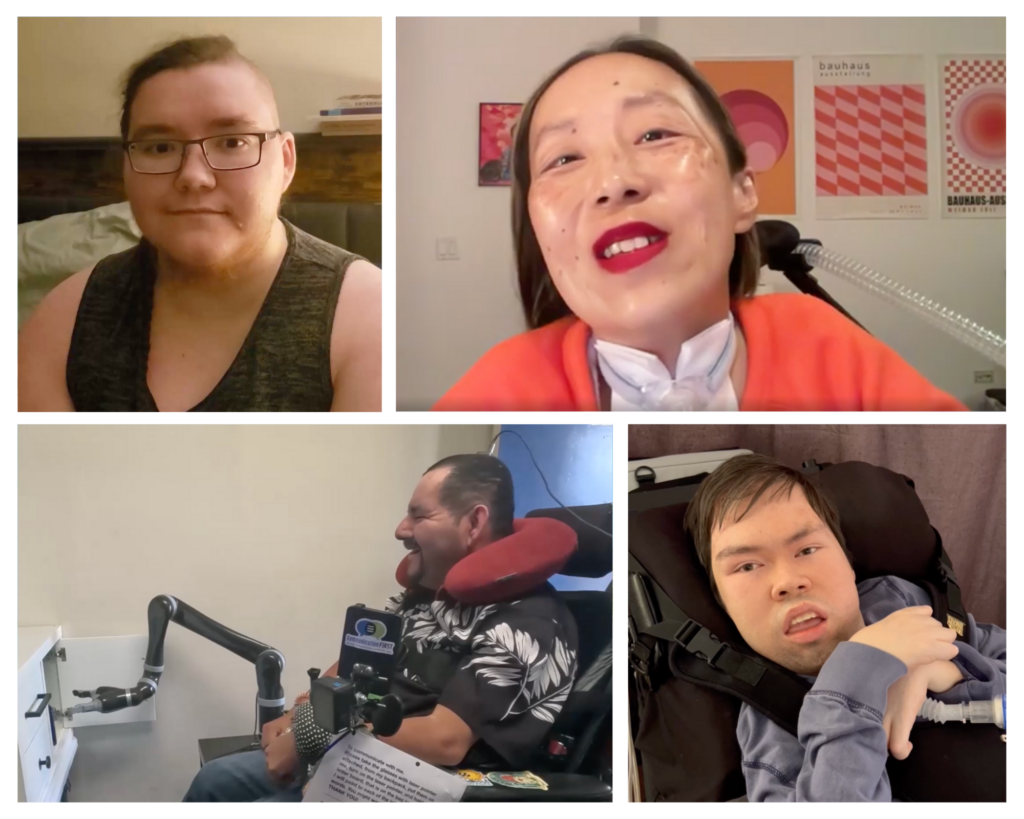
In a first-of-its-kind event held May 13-14, 2024, people with speech-related disabilities from around the U.S. told senior federal officials and researchers how future research dollars should be prioritized. The Future of AAC Research Summit was jointly organized by CommunicationFIRST and the Rehabilitation Engineering Research Center (RERC) on AAC. Participants using various forms of augmentative and alternative communication (AAC) strongly recommended that future research, technology development, training, and dissemination related to AAC must involve actual AAC users.
The Summit brought together diverse families, university researchers, service providers, government officials, and technology developers to learn directly from those who are most impacted by such work. Some particularly insightful moments came during the pre-recorded presentations of AAC users who, for disability-related reasons, were unable to travel to the Summit: Alice Wong, Ren Koloni, Pancho Ramirez, and Patrick Regan. The Summit concluded with a video featuring clips from a diverse group of 13 interviewees who use AAC.
We are thrilled to share these videos with you now. Scroll down to watch them!
Alice Wong
How Ableism Impacts People Who Need and Use AAC (transcript)
Alice Wong (she/her) is a disabled activist, writer, editor, and community organizer based in San Francisco. She is the founder and director of the Disability Visibility Project, an online community dedicated to creating, sharing and amplifying disability media and culture. Her latest anthology, Disability Intimacy, is available now. Alice joined CommunicationFIRST’s Advisory Council shortly after she became an AAC user.
Ren Koloni
To Include Us in Our Own Worlds, AAC is Not Optional (transcript)
As a multiply disabled and chronically ill autistic person with some access to speech, Ren Koloni (they/them) has been doing justice work from the sickbed for over a decade. Ren is privileged to bring their words and lived experience to bear in the struggle for access to opportunity, equity, and justice for those of us who have been denied it. They are a justice worker and Program Associate at CommunicationFIRST.
Pancho Ramirez
“Alternative Ways” to Access AAC Technologies (transcript)
Pancho Ramirez (he/him) is an active member of his community and a participant in cutting-edge clinical trial research at the University of California San Francisco that is testing brain-to-text technologies. He was profiled in the July 2021 New York Times article “Tapping Into the Brain to Help a Paralyzed Man Speak.” Pancho is also the Vice Chair of CommunicationFIRST’s Board of Directors.
Patrick Regan
The First Word in Accessibility is ACCESS (transcript)
Patrick Regan (he/him) has been an AAC user for more than 27 years. He received his first speech-generating device a few months after his second birthday. His access as an adult AAC/AT user continues to be a work-in-progress. Patrick is the President Elect of USSAAC, a member of ISAAC’s LEAD Committee, and the Coordinator of Activities and Events and Co-President of Bridging Communities Through Alternative Communication, an adult outreach program of The Bridge School.
Videoed Interviewees Who Use AAC
13 AAC Users: Priorities for Future Research (transcript)
In early spring, CommunicationFIRST advertised a survey to recruit diverse AAC users who were willing to be interviewed on camera about their priorities for AAC research. The interviewees hail from 10 different states, with ages between 20 and 74, and each use different forms of AAC. It was difficult to edit more than five hours of compelling footage into 17 minutes. We hope you enjoy the film as much as we did pulling it all together! Although this film premiered at the AAC Research Summit on May 14, 2024, it was produced as an independent project funded by the WITH Foundation.
Stay tuned for more blog posts about the Summit, including the in-person presenters. In the meantime, check out what we’ve published on social media to recap the Summit!

